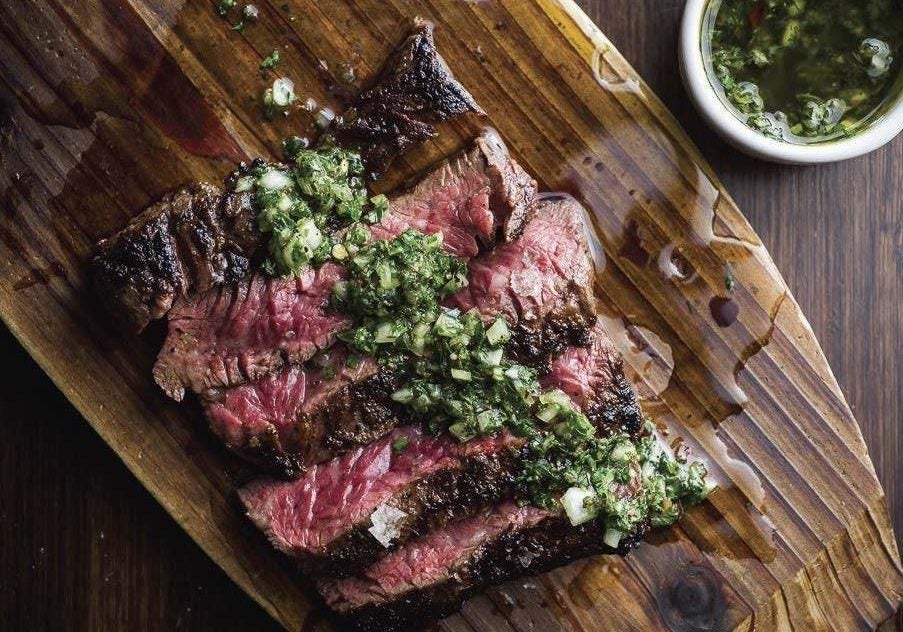
The only condiment you need this summer is a handful of herbs thrown into a blender with some oil and vinegar.
It took me a few years into my career as a home cook to stop believing that fresh herbs are an absolute scam put into motion by the Pointless Garnish Lobby. When I was younger, and on a tighter budget, they always seemed like an egregiously cost-inefficient way to add flavor or nutrition to anything, and I wasn’t going to go to blow my cash on a pathetic parsley sprig on the side of a plate or some anemic chives to sprinkle over soup. Plastic bags and containers of herbs involved so much washing and drying and plucking, and every bunch of cilantro or mint I bought just wound up getting slimy at the back of the refrigerator once I had managed to use a few leaves.
The turning point was when I realized that with the help of some olive oil and vinegar and an immersion blender, any scraps of herbs I had lying around could be transformed into a bright green sauce that would last for several days in the refrigerator, and make pretty much everything taste somehow fresher and more savory in an instant. I started throwing together shallot-parsley sauces to toss in summery farro salads, and spooned a tarragon-ramp sauce atop poached eggs. These were five-minute vinaigrettes that involved no more work than rinsing a handful of greens and pureeing them with a couple tablespoons each of oil and vinegar and a pinch of salt and pepper.
This formula is nothing original, of course. It’s the basic idea behind dozens of traditional sauces. In Morocco, cilantro is blended with lemon juice, garlic, and ginger to make chermoula that tops grilled fish and vegetables. In Argentina, the richness of grilled meat is offset by chimichurri—a sharp sauce of garlic, parsley, and vinegar. The Italian salsa verde (literally “green sauce” as you may have guessed), combines briny capers with parsley and lemon and sometimes anchovies for an all-purpose condiment. In her book In My Kitchen, Deborah Madison makes a version with fresh marjoram.

What all of these have in common is that they operate as sort of universal fix-alls to counteract salt, fat, and spice. If you’ve already salted a baking sheet of roasted vegetables into oblivion, but they’re still missing something, drizzle some green sauce on them before serving. If a grilled lamb chop starts to taste aggressively rich after the first couple bites, dip it in some green sauce. If your breakfast of poached eggs and yogurt starts to feel a little monochromatic, add some green sauce.
The starting point for any sauce in this genre should always be a foundation of fresh assorted herbs. Add alliums (garlic, shallots, scallions), oil, and vinegar gradually and cautiously to taste (and until you reach the thinness you prefer), followed by a few pinches of salt and pepper at the end. You can store your sauce for up to about three days in a sealed jar in the refrigerator. Here are a few building blocks that you can use to engineer a whole summer’s worth of green sauces.
Herbs
Chances are, almost any fresh herbs you have sitting in your refrigerator or growing on the windowsill will go well together. Parsley is a great backbone to any herb sauce because of its heartiness and bright, lasting color, but fresh cilantro, marjoram, basil, tarragon, oregano, sorrel, and mint add great character to a sauce’s flavor.
Alliums
Garlic, shallots, scallions, chives, ramps, and garlic scapes all do the trick here. If you’re using a more astringent allium, like garlic or shallots, go easy—you don’t want the refreshing coolness of the herbs to be overpowered.
Acid
A little bit of vinegar, citrus juice, or some capers or olives can all bring out the natural acidity in fresh herbs. The sweetness of lemon is a perfect foil to raw garlic or salty anchovies, and a little bit of sherry vinegar is a perfect match for shallots or scallions.
Oil
A few splashes of olive oil can go a long way toward giving a sauce a smooth texture without making it taste too heavy. As an added bonus, the oil helps preserve the herbs’ color and taste for a little longer in the refrigerator so you can make your sauce ahead for a party or use it in a bunch of different dishes over the course of a few days.